- Home
- Raymond Benson
Bond Movies 06 - The World Is Not Enough Page 17
Bond Movies 06 - The World Is Not Enough Read online
Page 17
Now, he sat in the sub, ready to dive and finish what they had begun over a year ago, and all he felt was an overwhelming sadness. They had said their goodbyes, Elektra and he. He would never see her again. He would go down with the sub, hopefully preventing a possible painful death from the ever-present bullet in his brain. It was the ultimate sacrifice. He was doing it for love.
It was possibly the noblest thing he had ever done in his life.
Someday, after she had lived a long and fruitful life. . . they would reclaim their loving alliance in hell.
16 - Countdown to Oblivion
Bond chased Elektra up the triple spiral staircase leading to the minaret's balconies.
‘James. You can't kill me. Not in cold blood,' her voice echoed in the stone chamber.
Bond wasn’t wavering. He clutched Zukovsky’s bloody- wet gun and ascended in the semi-darkness. As he swung around a comer of a landing, he heard an unexpected but familiar voice.
‘Bond!'
He stopped and kicked at the door. The room was empty except for the barred cell at one end. M, looking tired, breathed a sigh of relief.
Bond shot at the lock on the cell door, blowing it to bits.
‘Are you all right?’ he asked her.
‘Yes,’ she said, leaving her prison. ‘I just —
But Bond had already turned to go, heading upwards, after Elektra.
‘Go after the submarine!' M called after him. ‘Forget the girl! Bond!'
Elektra reached the uppermost balcony, which afforded a spectacular view of the Bosphorus and the city beyond. She stood there, looking out at the sea as the submarine pulled out of the quay. Bond stepped behind her; she had no escape.
'Call him off,’ he said, holding the walkie-talkie to her.
Elektra turned around to face him.
‘I won’t ask again. Call him off!’
She looked at him questioningly. Did he really mean it? Hesitantly, she took the radio and held it to her mouth.
This is your last chance, Bond thought. Save the city. Save yourself.
‘Renard . . .’ she said into the radio.
Bond waited.
‘You wouldn’t kill me,’ she whispered to Bond. ‘You’d miss me.’
Then her face broke into a perverted grin and she shouted into the radio, ‘Dive! Dive! Bond is —’
The force of the bullet knocked her back against the balcony rail. She dropped the radio and stared at Bond in disbelief that he could actually shoot her.
‘I never miss,’ Bond said.
Elektra King slumped to the floor, shocked by her mortality. Gasping for breath, she looked up at Bond. She was attempting to say something. Bond crouched beside her and listened, but he couldn’t understand the words. She was speaking — no, she was singing! — singing in a whisper. It sounded like a lullaby.
After half a minute, she choked once and shuddered. There might have been a hint of regret in her watering eyes, but this quickly vanished as a cold, dark shadow passed over her face. Whatever demons had been tormenting her were now gone. She attempted to complete the verse of the lullaby, but could only manage a final exhalation of breath.
Bond looked at the lovely face, now relaxed and in peace; he reached out and caressed her cheek, just once.
Behind him, in the doorway, M had seen it all. She hardened her heart to the swirling cacophony of emotions that yearned to cry out for the poor, tortured girl. Bond had done his duty, but M couldn’t help saying a silent prayer for the soul of Elektra King.
Bond stood, looked over the rail to see the nose of the submarine heading into the Bosphorus, half-submerged. The hatch was still open. He stepped onto the ledge and prepared himself. Without a second thought, he performed a flawless swan dive, one hundred feet to the water. He hit it like a knife and found it very cold. He surfaced near the sub, grabbed a ladder and pulled himself up. Splashing through the water that was flooding over the rail he appeared in front of the amazed sailor who was just shutting the hatch. Bond slammed the lid on the mans head, then got inside. He closed it and turned the wheel seconds before the hatch slid underwater.
Bond crept down into the dark vessel. Renard’s small crew was spread throughout the sub, so he knew the best tactic was silence. He peered into the control room and saw Renard and several men at various stations. Beyond them, on the other side, were the outer chambers of the machine room and reactor room.
He moved toward the bow and down a ladder to what appeared to be living quarters. He found one man working on a radio and smoking a cigarette. Bond’s gun barrel dug into the man’s temple.
‘Easy,’ he said. ‘How do you want to die? That?’ He indicated the cigarette. ‘Or this?’ He pressed the barrel harder into the man’s head. ‘One word and your brains will be on the floor. Now — take me to the girl they brought on board.’
The man's cigarette dropped from his mouth as he nodded in compliance. He led Bond forward and down another ladder to a crew room. He pointed to a solid metal door.
‘She’s in there?’ Bond asked.
The man nodded.
‘You have the key?’
The man offered it.
‘Thanks. Now we’ll knock, all right?’
The man nodded again.
Bond took hold of the man's head and banged it hard on the door, rendering him unconscious. He then unlocked the door and found Christmas Jones sitting on a cot.
‘James!’ she said, stunned to see him.
He untied her bonds, put his finger to his lips, and then led her through the shadows of the sub toward the control room. They soon came upon the tank room and found a man operating them.
Renard’s voice came over the intercom. ‘Flood tanks four and five . . .’
‘Hooding tanks four and five,’ the man said into a radio on the table, then he did as he was told. As soon as he was finished, Bond knocked him out with the butt of his gun.
‘We have to get to the reactor room,’ he said. ‘It’s on the other side of the control room, but Renard and his men are in there.’
‘Is there another way?’ she asked.
‘We go down to the torpedo bay.’
Before they could move, though, a man came through a hatch. Bond lashed out at him, but the man’s reflexes were sharp. He deflected Bond’s blow and rebounded with a vicious kick to Bond’s chest. Bond dropped his gun and it slid across the floor. Christmas watched helplessly as the two men fought silently and ferociously. The man drew his gun but Bond kicked it out of his hand. This was followed by a solid punch to the man’s face, sending him sprawling over the table where the radio sat. He reached for the fire alarm, but Bond grabbed his legs and pulled him off the table. The man used the momentum to twist and elbow Bond in the stomach.
‘Open the tanks,’ Renard’s voice said over the intercom.
Hunched over, Bond propelled himself forward and knocked the man back onto the table. He grabbed the radio receiver and wrapped the coiled cable around the man’s neck, throttling him.
‘Open the tanks. Do you copy?’ Renard’s voice came again.
Bond pulled the cable tighter. The man's eyes bulged. Disguising his voice, Bond pushed the transmit button on the microphone and said, Tanks open.’
The man finally slumped to the floor. Christmas was obviously shaken. Bond retrieved his gun, took her hand and led her forward.
Unaware of the situation in another part of the boat, Renard left the control room momentarily and joined Truhkin in the machine room. Truhkin was hard at work with the extruder, a machine that resembled a gigantic V8 engine. He carefully lifted the half-grapefruit-sized plutonium core from the metal box, then placed it inside the extruder, which would mould the substance into the shape of a reactor control rod. Satisfied that the procedure was going smoothly, Renard left Truhkin to his business and went back to the control room.
Bond and Christmas found a hatch with a small window looking into the control room. Bond peered in and saw five crewmen at different con
soles. Renard was pacing amongst them.
‘Level out at one hundred feet,’ he commanded. ‘Hold her steady. ’
The crewman closest to Bond operated the buoyancy controls. The helmsman, across the room, reduced the engine thrust. Rcnard felt die submarine’s position change, nodded, and went back through the hatch toward the reactor room.
Bond whispered to Christmas, ‘If we could force them to the surface, it would show up on the spy satellites. That would bring out the Navy. Wait here.’
‘Where are you going?’ she asked, wide-eyed.
‘In there.’
Renard rejoined Truhkin in the machine room in time to see the plutonium rod emerge from the end of the extruder.
Bond opened the hatch, stepped into the control room and slammed the butt of his Walther into the buoyancy control crewman’s head. The rest of the crew reacted, going for their guns, but Bond was faster.
‘Don’t even think of it,’ he said, covering them.
He scanned the controls at his side and saw four emergency handles that would blow the buoyancy tanks. Bond grabbed the two for the forward tanks and pulled them down.
Alarms sounded throughout the ship and a loud hiss of air could be heard everywhere. The main forward ballast tanks immediately began filling with water. Bond purposefully avoided opening the aft ballast tanks so that the submarine would dive nose-first, which it did - abruptly.
Renard cursed and ran back to the control room with his gun drawn to find his crew standing frozen at their positions.
Upon seeing Bond, Renard screamed, ‘Shoot him!’
Everyone dived for cover as he and Bond exchanged fire, but the sub’s tilting threw them off-balance. The bullets ricocheted off the control panels, blowing them to pieces. Renard wedged himself in the doorway leading to the reactor room, but the other crewmen lost their footing and fell to the deck. Two crewmen fired their guns at Bond, who successfully leapt out of the way in the nick of time. The bullets shattered the buoyancy control panel, forcing Bond back into the corridor with Christmas.
‘Do you know what you did in there?’ she asked.
‘Like riding a bike,’ he replied.
‘What kind of bikes did you ride?' she asked.
‘Just wanted to put him on edge . . .’
They started to run back from where they came, but two new crewmen appeared at the far end of the passageway and opened fire. Bond threw Christmas to the floor and shot at them, but the Walther was out of ammunition. Thinking quickly, he jumped on top of Christmas, held on to her, and rolled with her through an open hatch to their left. Once they were inside, Bond leaped to his feet and slammed the door shut. As they took stock of their surroundings, Bond realised that they were in the bow torpedo room.
The submarine’s nose continued to dive. Bond and Christmas shifted to the side of the room as everything that wasn’t screwed down began to slide. They grabbed the nearest fixed objects and hung on as the room turned ninety degrees.
‘Get us level!’ Renard shouted to a crcwman in the control room. The man pulled on the buoyancy controls, but there was no response. The machinery had been completely demolished by the gunfire.
‘It’s no good!’ he yelled back.
The submarine tilted further until the entire vessel was hanging vertically in the water.
Renard cursed again, then climbed up, back into the machine room, and shut the door, now at his feet. As the crewmen attempted to regain their footing, the helmsman accidentally hit the engine control, sending it to FULL AHEAD. He crashed with the rest of the men into the wall as the submarine lunged violently toward the bottom of the sea.
Bond and Christmas fell back against the racks of torpedoes. The sound of the engines was deafening. Christmas screamed. Bond held her as he looked around the room. Emergency equipment was stowed in netting against a bulkhead near them. He pulled at the straps, emptied the netting, and thrust Christmas inside.
‘Quick!’ he shouted, following her into the netting.
They secured themselves just as the submarine crashed into the sandy bottom of the Bosphorus.
The boat jolted with the force of an earthquake. Renard slammed hard against the wall of the machine room. The crewmen in the control room were not so lucky. Chairs and desks broke free and crushed them against the damaged equipment.
In a few moments, it was over. There was an eerie silence, save for the occasional groan of hull stress and the wail of alarms.
Renard, dazed, looked up and saw that the extruder had slid into Truhkin and killed him . . . but he was holding the finished plutonium control rod in his clenched fists. Rcnard got up and wrenched it free. He then made sure that the hatch to the control room was sealed.
Bond and Christmas climbed out of the netting just as a horrible creak resounded through the chamber. A rupture at the end of the racks of torpedoes spread across the wall; water gushed toward them at a frightening rate.
‘Climb!’ he shouted. He pulled Christmas up and they ascended toward the control room. ‘Keep moving!’
As they emerged into the demolished chamber, the water was already pouring through the hatch, splashing at their feet. They struggled together to shut the hatch, but by the time they were successful, the water was up to their knees.
Renard climbed to the reactor room and, without flinching, he opened the cover of the glaring reactor. He was bathed in a ghostly blue light.
Renard was no nuclear physicist, but he understood enough about reactors to get the job done. A reactor’s only real purpose, he knew, was to generate heat to boil water into saturated steam. The only difference between it and any other type of steam-powered turbine plant was the amount of energy concentrated in the nuclear fuel in the reactor core, as well as the complete lack of any need for air.
The process of nuclear fission was really quite simple. An atom was split and released two neutrons, generating energy as heat. When the two neutrons hit two more atoms, four more neutrons were thrown, and so on, until the result was an uncontrolled, supercritical fission reaction. An atomic explosion.
However, Renard knew that, here in the submarine, the amount of energy released by the splitting atoms was controlled by control rods that were made of a neutron-absorbing material such as cadmium or hafnium. These rods were set to absorb the right amount of neutrons to bring the reaction into controlled, critical fission. This reaction still generated a great deal of heat, boiling water into saturated steam to power the sub’s turbines, but the process could continue safely for years.
Renard stared at the glowing reactor core, transfixed momentarily by the power it held. He studied it carefully, picking out what he presumed to be the uranium fuel elements that had been formed into plates to allow maximum heat transfer to the primary coolant loop. They were mounted parallel to each other in an assembly mounted on top of a support structure in the base of the reactor vessel. In between the fuel elements were the control rods, designed to drop into place in the event of a reactor problem. The coolant of the primary loop circulated around the core, feeding the heated coolant into a steam generator. This, in turn, directed the steam into a secondary cooling loop that fed a pair of high- pressure turbines in the machinery spaces. There, the steam was condensed into water and sent back into the steam generator. The turbines were responsible for turning the main propeller shaft, as well as providing electrical power to the boat and its equipment.
Renard held the plutonium control rod and prepared himself for what he had to do. The job would have to be performed slightly ahead of schedule . . .
The submarine lurched again and threw him down. He struggled to get back up to the reactor but found it to be exhausting. For some inexplicable reason, he felt real pain on the side of his head where he had been shot It was odd to actually feel something there after so long. Was the bullet moving? Was the time the doctor had given him now up? No! He would finish Elcktra’s plan!
He stared into the violet blue heat, mesmerised by its beauty. It was almos
t as beautiful as she . . .
He pressed a button and one of the neutron-absorbing control rods slowly rose from the reactor. He reached out and released it from its berth, then threw it across the room. Renard carefully picked up the plutonium rod and prepared to insert it into the orifice left by the rod he had removed.
He smiled, but the pain in his head overpowered him.
Back in the control room, Christmas noticed a panel light.
‘Oh my God, he’s opened up the reactor.’ Bond studied the panel as she interpreted more lights. ‘And he’s sealed himself in.’
‘And us out,’ Bond said.
‘He’s already withdrawn one of the control rods. He’s going to insert the plutonium. What do we do?’
Thinking fast, Bond moved to the controls near the tanks. He took four seconds to study them, then began to hit switches. He examined a control panel that was marked, in Russian, ‘Forward and Aft Escape Chambers’. He looked around the room and saw that the Forward Escape hatch was located there, as well as a cabinet on the wall.
‘Look in there for re-breathers,’ he said, pointing. She opened the cabinet and found that they had been ripped to shreds.
‘Sabotaged,’ she said. ‘No one was meant to get off the sub alive.’
i never liked those things anyway,’ he said. He pushed a button on the panel.
The Aft Escape hatch opened, high up on the sub. Water flooded the escape chamber there, but an inner door stopped it from getting into the submarine.
She suddenly understood what he was planning to do and looked at him questioningly.
‘You have a better idea?’ he snapped. He opened the inner door to the Forward Escape Chamber and said, ‘Count to twenty. When you get to twenty, push this button. It will open the inner door of the Aft Escape hatch. It can only be opened for a few seconds or we’ll sink.'

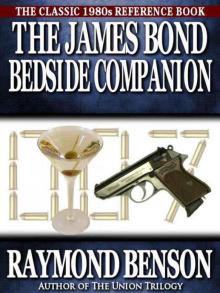 The James Bond Bedside Companion
The James Bond Bedside Companion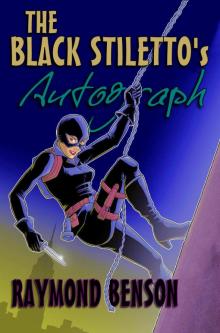 The Black Stiletto's Autograph
The Black Stiletto's Autograph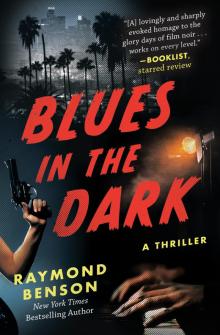 Blues in the Dark
Blues in the Dark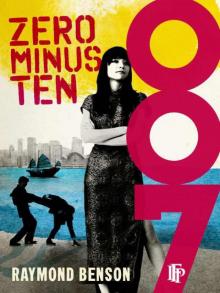 Zero Minus Ten
Zero Minus Ten The Black Stiletto
The Black Stiletto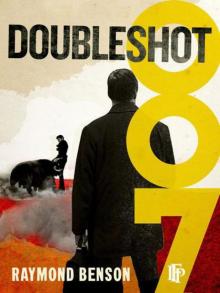 Doubleshot
Doubleshot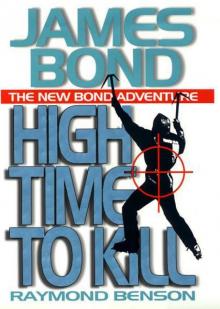 High Time To Kill rbb-3
High Time To Kill rbb-3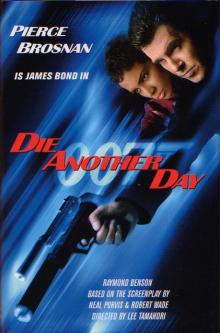 Bond Movies 07 - Die Another Day
Bond Movies 07 - Die Another Day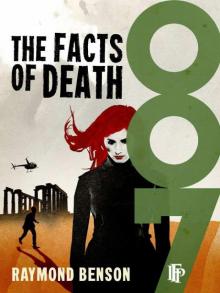 The Facts Of Death
The Facts Of Death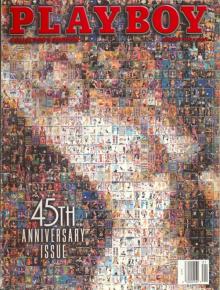 Midsummer Night's Doom
Midsummer Night's Doom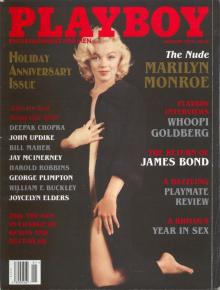 Blast from the Past
Blast from the Past The Secrets on Chicory Lane
The Secrets on Chicory Lane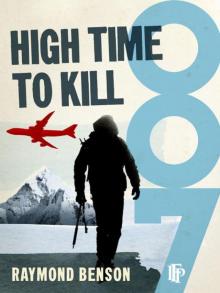 High Time To Kill
High Time To Kill The Black Stiletto: Black & White
The Black Stiletto: Black & White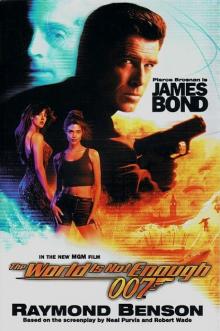 The World Is Not Enough jb-1
The World Is Not Enough jb-1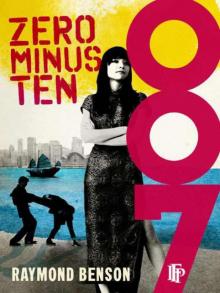 Zero Minus Ten rbb-1
Zero Minus Ten rbb-1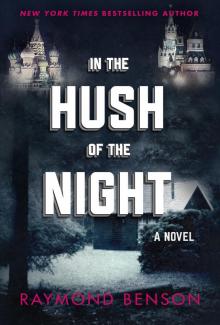 In the Hush of the Night
In the Hush of the Night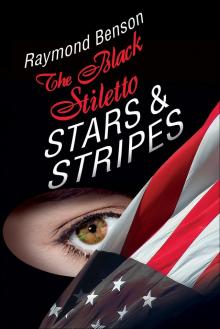 The Black Stiletto: Stars & Stripes
The Black Stiletto: Stars & Stripes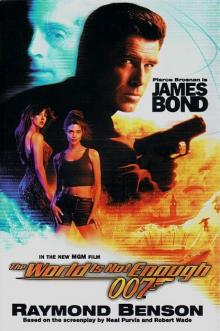 Bond Movies 06 - The World Is Not Enough
Bond Movies 06 - The World Is Not Enough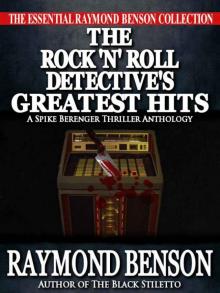 The Rock 'n Roll Detective's Greatest Hits - A Spike Berenger Anthology
The Rock 'n Roll Detective's Greatest Hits - A Spike Berenger Anthology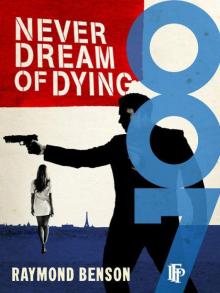 Never Dream Of Dying
Never Dream Of Dying